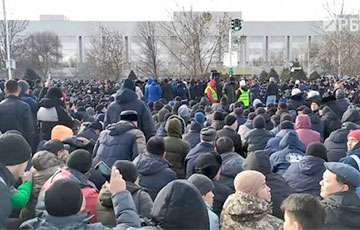Impasse For Authoritarian Regimes
3- 13.01.2022, 10:15
- 7,822

On the lessons of Kazakhstan for the authors of the "transit of power".
Since the beginning of 2022, the attention of Belarusians is riveted by the political crisis in Kazakhstan - too many parallels and analogies with the events of 2020 are seen. The similarities and differences of the situations, useful experience and possible consequences of Belarus' participation in the CSTO mission were discussed by political observer Piotr Kuzniatsou in the new episode of the programme "What was it?"
- I think that it will not affect the plans concerning the referendum, for the reason that the Belarusian regime cannot afford to show so much insecurity, - Piotr Kuzniatsou considers. - And if they are not afraid to show weakness in front of the people, they will certainly be afraid to show it in front of the law enforcers.
But, of course, what happened in Kazakhstan is a shame
You can leave power to some reliable person, but that doesn't rule out that he will go over your head, too.
In the system that the autocrats set up, everything is firstly tied to the individual, secondly, there are no laws as we know very well, and thirdly, there is no morality as such. They teach their people from the beginning that politics is a dirty business, that you can fight without rules.
Everyone learns this lesson rather quickly and easily, and then the words "Do not betray!" don't really work, because in system of coordinates where there are no rules, there is no such question - to betray or not to betray ... After all, Nazarbayev was also betrayed by his friends in CSTO, no one defended him; and troops were not brought in to protect him or constitutional order: no one was interested in that.
Piotr Kuzniatsou believes that all that has happened in Kazakhstan is quite logical, since autocratic regimes "are by definition incapable of building an effective and stable system of government that would be capable of self-reproduction, crisis-free transits, and so on".
What does the debut of the CSTO, the resource of which was used in practice for the first time in the history of its existence, mean?
- There is a tendency that certain heads of former Soviet republics are doing everything to set up the CSTO in such a way, and to redefine its mission as defending certain dictatorial regimes using the examples of the precedents, - Piotr Kuzniatsou says. - As an instrument, the CSTO was generally dead: the treaty has been in existence for 30 years, the organization - for 29 years, and there was always talk that it might be needed for something. However, as practice has shown, it is not able to protect Armenia, to take control of the borders with Afghanistan, but it has managed to send several thousand people to Kazakhstan - although they have to be brought out already...
In the 19th century there were, after all, different political conditions, - Piotr Kuzniatsou disagrees. - Now the dictators, of course, really want to have a 'big brother' behind them who will always stand up for them and crush the nations. But if this becomes more or less a sane practice, Russia, as the main core of the CSTO, will find itself hostage to different variations in the internal policies of its allied states.
I am not sure, for example, that they would like to see Tokayev as a real ruler of Kazakhstan, but he has played out his scenario, pushed Nazarbayev aside and called for CSTO under very noble slogan "defend legitimate power". And Russia was simply left with no choice.









